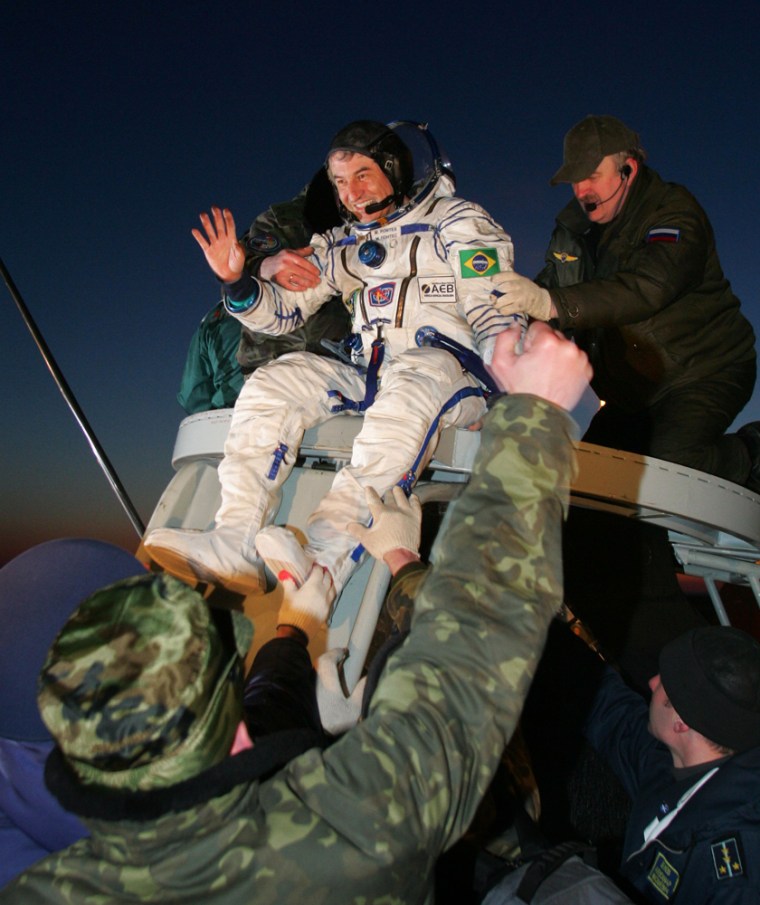American, Russian and Brazilian astronauts endured a bone-jarring, three-and-a-half hour ride from the international space station back to Earth on Sunday, landing on target in the freezing Kazakh steppe.
The Russian TMA-7 capsule carried American commander Bill McArthur and Russian flight engineer Valery Tokarev, who each spent six months on the space station, as well as Brazilian astronaut Marcos Pontes. It touched down about 30 miles northeast of Arkalyk at 3:47 a.m. Moscow time (7:47 p.m. ET Saturday).
Officials at Russia’s Mission Control in Korolyov, outside Moscow, called the flight flawless. They were in contact with the capsule for much of its journey home, and they said three crew members were feeling well.
The three travelers were given hot tea and wrapped in blankets before being whisked into a medical tent for examinations.
McArthur and Tokarev began their stay at the international space station in October. McArthur, 54, of Wakulla, N.C., looked exhilarated as he rested in a chair after the landing.
“I’ve never been through anything like that before,” he said, describing the return journey from space as a “wild ride.”
The NASA veteran was the mission commander and science officer, responsible for a series of experiments that included work on microgravity.
Pontes, who spent nine days in space, carried a Brazilian flag and national soccer jersey on his trip to the space station, hoping it would bring his national team victory in this summer’s World Cup. Brazil’s first astronaut ebulliently thanked everyone in English.
“I am very happy,” he said.
More than 15 aircraft, including helicopters, and some 150 searchers were deployed in the landing zone. The temperature dipped to minus 12 at the landing site.
Ground crews reached the capsule within minutes of the landing and opened the hatch.
Pontes, shown on TV seated in a chair outside the capsule, flashed a wide grin and gave a thumbs-up as his bulky spacesuit was removed. He was handed a Brazilian flag and a Panama hat that was pulled out of the capsule — apparently one that he had carried to the space station in tribute to Brazilian inventor and aviator Alberto Santos Dumont, to whom Pontes had dedicated his flight.
The three later flew into the Star City space training complex outside Moscow for further medical checkups and debriefing, televised pictures showed.
Pontes, a Brazilian Air Force lieutenant colonel, trained in the United States and had been scheduled to fly to the station aboard a shuttle — plans that were scrapped after the February 2003 Columbia explosion.
The American space program has depended on the Russians for cargo and astronaut delivery since the Columbia disaster grounded the shuttle fleet. The shuttle Discovery visited the station in July but problems with the external fuel tank’s foam insulation have cast doubt on when shuttles might fly again.
Some Brazilians criticized Pontes’ trip because it reportedly cost the Brazilian Space Agency $10 million.
But the 43-year-old was featured daily on Brazilian TV news broadcasts and across newspaper pages and was a widespread source of pride for Brazilians.
Asked what medal Pontes would receive when he returns to Brazil, the head of the country’s space program, Raimundo Mussi, suggested the national adulation he has inspired would be the best recognition of all.
“Certainly he will receive a decoration but the best decoration will be a big hug from all Brazilians,” Mussi told reporters at Russian Mission Control.
Tokarev told Russian space agency chief Anatoly Perminov in a phone call from the landing site that he was proud to have completed his mission so close to Wednesday’s upcoming 45th anniversary of the flight of Soviet cosmonaut Yuri Gagarin, the first person to orbit the Earth.
McArthur and Tokarev were replaced by Russian commander Pavel Vinogradov and U.S. flight engineer Jeff Williams, who arrived at the station with Pontes on April 1.
